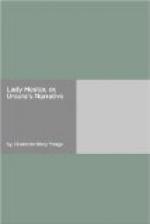The Deerhursts owned a villa on the outskirts of Shinglebay; indeed, I believe it was the difficulty in letting it that had unwillingly forced Mrs. Deerhurst home, after having married her second daughter, but not Emily. She was only a mile and a half from Spinney Lawn, and speedily became familiar there, being as entirely Hester’s counsellor in etiquette as was Perrault on business. People saw a marked improvement in elegance from the time she became adviser.
That next winter poor Joel Lea died. I suppose it was merely the dulness and want of exercise that killed him, for he had lost flesh and grown languid in manner for months before a low fever set in, and he had no power to struggle with it.
He had been ill a long time, when he sent a message to beg Mr. Torwood to come and see him. Jaquetta and I persuaded ourselves that he had discovered that Perrault had suborned witnesses, or done something that would falsify the whole trial.
Jaquetta said she should be very glad for Fulk, and if it happened now little Alured would never feel it; but for her own part, she should hate to go back to be my lady again. She had never known before what happiness was.
I could not help laughing. Nobody had ever detected anything amiss with Lady Jaquetta Trevor’s spirits, but that they were too high at times.
“Of course I don’t mean that I was miserable!” she said; “but there’s something now that does make everything so delicious.”
“Could you not take that something to the park?” I asked, laughing.
“I don’t know! It would not be so bad if I could run in and out at the parsonage as I do now.”
And as I smiled, it smote me as I recollected that Arthur Cradock was always at the parsonage in the vacations. Jaquetta had been sketched many a time as nymph of the orchard, and many a nymph besides. And if he was yielding to his brother’s wisdom in making medicine his study and art his pleasure, was not our unconscious maiden the sugar that sweetened the cup of prudence? Might not elevation be as sore a trial to her as depression had been to us?
However, our troubling ourselves was all nonsense. Good Joel Lea would never have connived at any evil doings. All he had wanted of Fulk was to be certain of his forgiveness for the injury he had suffered through his wife, and to entreat him to keep a watch over her and the boy.
“You are her brother, when all is come and gone,” he said; “and I do not trust that Perrault. If ever he fails her, or turns against her, you’ll stand her friend, and look to the boy?”
Fulk heartily promised, and Joel further begged him to write to her eldest brother, Francis Dayman (who was prospering immensely in the timber trade), and let him know the state of things—though he had been so angered at Hester’s sacrifice of his mother’s good name and his own birth, that he had broken with her entirely.




